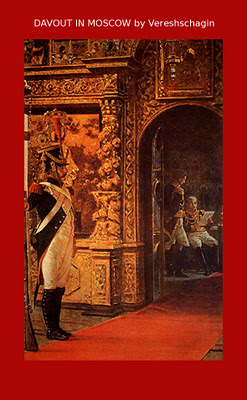NAPOLEON IN RUSSIA
The Moscow fire was caused by Russians incendiaries let out of prison on the orders of Rostopchin, Governor of the city. He later denied the part he played and Leo Tolstoy gave the impression everything was Napoleon's fault in War and Peace.
Most of the city was devastated and hundreds of buildings were burnt to the ground - their cellars subsequently becoming traps for careless members of the Grand Army who did nor watch where they were putting their feet. It is often stated by many historians that the fire meant Napoleon could never have wintered in the city due to a lack of resources. However, anyone who reads the memoirs of Bourgogne and Coignet will discover that there was ample food for the Army had it been carefully utilized. At the time, a lot of supplies were wasted or squandered for the famished soldiers, seeing the inhabitants burning their own city, took to looting and stealing everything within their grasp. Had the Army retired the following Spring the retreat would have taken place in much milder weather. Then again, it is doubtful if Napoleon could have remained that long away from Paris for political reasons - it was his absence that led to the Malet conspiracy.
Although, as the map shows, some two-thirds of the city was burnt out, there were still plenty of massive mansions and houses for the troops to shelter in. Bourgogne states that: "To last for the winter we had seven large cases of sweet champagne, a large quantity of port wine, five hundred bottles of Jamaica rum, and more than a hundred large packets of sugar. And all this was for six non-commissioned officers, two women, and a cook." He adds: "We had a large number of hams, having found a shop full of them; add to all this a quantity of salt fish, a few sacks of flour, two large barrels filled with suet, which we had taken for butter, and as much beer as we wanted. These constituted our provisions, in case we had to spend the winter in Moscow."
Napoleon stayed far too long in Moscow. He kept hoping the Tsar would sue for peace now that French troops were in the city, but Alexander was determined to have nothing to do with his emissaries - to him it was already total war, even if Napoleon did not realize this. The unusually mild Russian autumn also added to the Emperor's determination to wait it out. But no message came from the Tsar.
The early glut of provisions was bad for the Army's morale. Soldiers set up impromptu markets and bartered for food, furs and valuables.
For Bourgogne, Moscow was the most beautiful city he had ever seen, and this from a man who had been to Paris, Madrid, Berlin, Warsaw and Vienna. On September 14th he got his first sight of the place: "It was a beautiful summer's day; the sun was reflected on all the domes, spires and gilded palaces... the effect was to me - in fact, to everyone - magical." Hence the shock when the inhabitants then set torches to their own buildings.
The religious Muscovites were outraged when they saw horses being stabled in their churches. It made the invading Army seem to them to be little more than a horde of godless savages, even if some did attend mass.
While Marshal Davout did his best to serve Napoleon, Murat seemed hell bent on destroying his own cavalry - posing for any passing Cossack who was near enough to see the glittering uniforms of his own creation.
AND THEN CAME THE FIRE
The longer he waited, the worse it became for Napoleon and the Grand Army...
C. John Tarttelin FINS 2011
A SOULADREAM PRODUCTION






















This helped a lot.
ReplyDelete